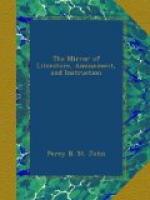SPIRIT OF DISCOVERY.
Analogous Growth of Trees and Animals.
Trees placed in an exposed situation have their resources;—the object being to protect the sap-vessels, which transmit nutriment, and which lie betwixt the wood and the bark, the tree never fails to throw out, and especially on the side most exposed to the blast, a thick coating of bark, designed to protect, and which effectually does protect, the sap-vessels and the process of circulation to which they are adapted, from the injury which necessarily must otherwise ensue. Now, if an animal is in danger of suffocation from want of vital air, instead of starving by being exposed to its unqualified rigour, instinct or reason directs the sufferer to approach those apertures through which any supply of that necessary of human life can be attained, and induces man, at the same time, to free himself from any coverings which may be rendered oppressive by the state in which he finds himself. Now it may be easily proved, that a similar instinct to that which induced the unfortunate sufferers in the black-hole of Calcutta to struggle with the last efforts to approach the solitary aperture which admitted air to their dungeon, and to throw from them their garments, in order to encourage the exertions which nature made to relieve herself by perspiration, is proper, also, to the noblest of the vegetable tribe. Look at a wood or plantation which has not been duly thinned:—the trees which exist will be seen drawn up to poles, with narrow and scanty tops, endeavouring to make their way towards such openings to the sky as might permit the access of light and air. If entirely precluded by the boughs which have closed over them, the weaker plants will be found strangely distorted by attempts to get out at a side of the plantation; and finally, if overpowered in these attempts by the obstacles opposed to them, they inevitably perish. As men throw aside their garments, influenced by a close situation, trees placed in similar circumstances, exhibit a bark thin and beautifully green and succulent, entirely divested of that thick, coarse, protecting substance which covers the sap-vessels in an exposed position.
There is a singular and beautiful process of action and re-action which takes place betwixt the progress of the roots and of the branches. The latter must, by their vigour and numbers, stretch out under ground before the branches can develope themselves in the air; and, on the other hand, it is necessary that the branches so develope themselves, to give employment to the roots in collecting food. There is a system of close commerce between them; if either fail in discharging their part, the other must suffer in proportion. The increase of the branches, therefore, in exposed trees is and must be in proportion with that of the roots, and vice versa; and as the exposed tree spreads its branches on every side to balance itself against the wind, as it shortens its stem or trunk, to afford the mechanical force of the tempest a shorter lever to act upon, so numerous and strong roots spread themselves under ground, by way of anchorage, to an extent and in a manner unknown to sheltered trees.—Quarterly Review.




